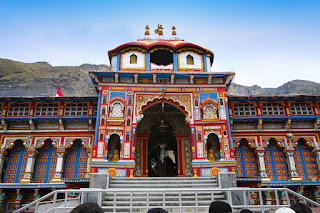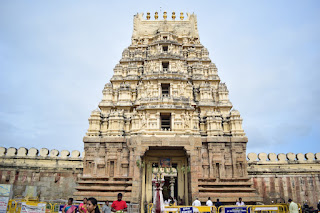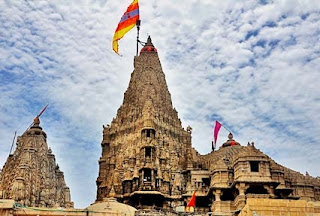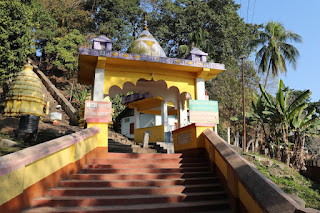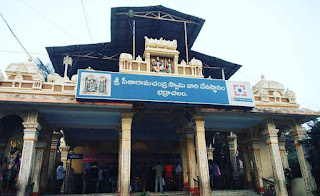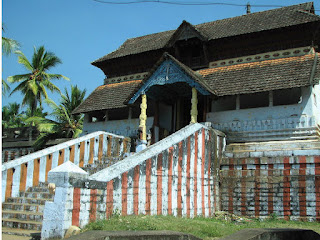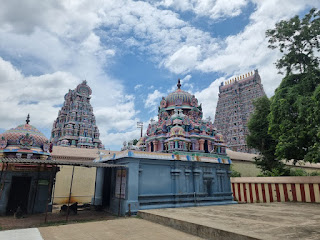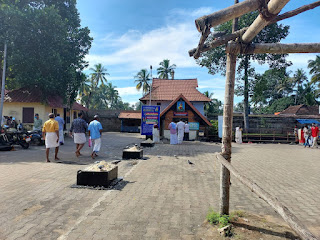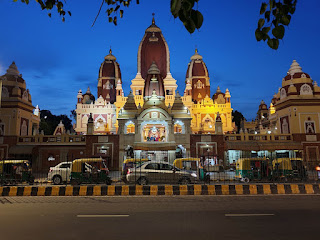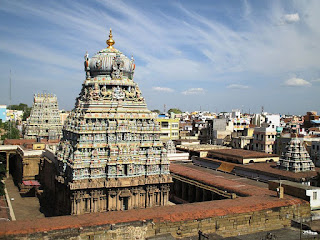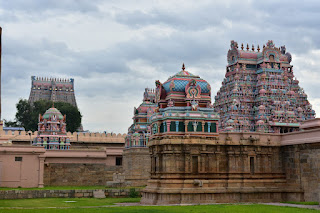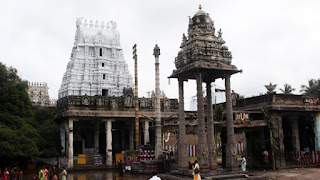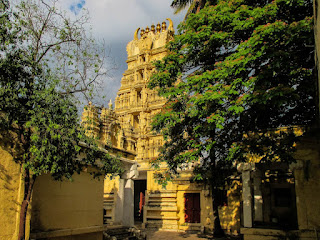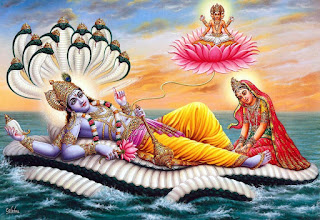
If you have a spiritual inclination and are looking to explore the depths of devotion then here are a few famous Vishnu temples in India:
- Badrinath Temple / Badri Vishal, Uttarakhand
- Ranganathaswamy Temple, Karnataka
- Padmanabhaswamy Temple, Kerala
- Jagannath Temple, Odisha
- Dwarkadhish Temple, Gujarat
- Sri Venkateswara Temple, Andhra Pradesh
- Sri Sri Aswaklanta Temple, Assam
- Sita Ramachandraswamy Temple, Telangana
- Shrinathji Temple, Rajasthan
- Adikesava Perumal Temple, Tamil Nadu
- Sarangapani Temple, Tamil Nadu
- Thiruvallam Sree Parasurama Temple, Kerala
- Laxminarayan Temple, Delhi
- Vitthal Temple, Maharashtra
- Koodal Azhagar Temple, Tamil Nadu
- Vittala Temple, Hampi, Karnataka
- Sri Ranganathaswamy Temple, Tiruchirappalli, Tamil Nadu
- Sri Vaikuntha Perumal Temple, Kanchipuram, Tamil Nadu
- Devarajaswami Temple, Kanchipuram, Tamil Nadu
- Jagdish Temple, Udaipur, Rajasthan
- Lakshmiramana Swamy Temple, Mysore, Karnataka
Badrinath Temple / Badri Vishal, Uttarakhand
This is undoubtedly one of the most prominent and important temples dedicated to lord Vishnu in the form of Badri. Each year the temple witnesses a huge footfall of pilgrims from all over the world, during its on season for a limited duration of 6 months, looking to douse themselves in some spiritual enlightenment and attain their Moksha by taking a dip in the holy river of Alaknanda flowing past it.
- Temple Timing: 4:30 am – 6:30 am / 6:30 am – 12 noon – 3:00 pm / 6:00 pm – 9:00 pm
- Best Time to Visit: May – July and September – November
- Entry Fee: No entry fees
- Visit Duration: 1 to 2 hours
Ranganathaswamy Temple, Karnataka
Built on an area of 156 acres, located in the town of Srirangam and popular for its magnificent architectural representation, this temple has the largest temple in India and one of the largest in the world. Completed in the year 1987 the idol of the presiding deity is in the reclining form of lord Vishnu. made primarily by utilising Dravidian architecture.
The walls of this temple is decorated in neatly carved out colourful representations of mythological events, pristine artwork and delicate engravings. With over 50 shrines dedicated to gods and goddesses other than lord Vishnu, the date of construction of the temple can be traced back to the Sangam era i.e. the 10th century which makes it even more interesting and steeped in history.
- Temple Timings: 9:00 am – 12 noon / 1:15 pm – 6:00 pm / 6:45 pm – 9:00 pm
- Best Time to Visit: August – March
- Visit Duration: 2 to 3 hours
- Entry Fee: No entry fees
- Quick Seva: Rs.250/- per head.
- Viswaroopa Seva: Rs.100/- per head
Famous for being one of the most striking temples in India with a gleaming golden outer layer this is one of the most important Vishnu temples in India. Featuring towering high Gopurams and representing an artistic infusion of Tamil and Kerala style of architecture the temple has always drawn the attention of Hindu devotes and avid Vaishnavites.
Recently the temple was brought into the news since its secret underground chambers were opened which contained trillion dollar worth of gold coins, statues, thrones etc. the third vault (B) still remains a mystery since the head priests over there decided that this will be a destructive omen on the people doing so. Even if you are not a religious individual you can go there for its historical, mythological and mysterious importance.
- Temple Timings: 6:30 am – 7:00 am / 8:20 am – 10:00 am / 10:30 am – 11:10 am / 5:00 pm – 6:15 pm / 6:45 pm – 7:20 pm
- Best Time to Visit: October – April
- Entry Fee: No entry fees
- Visit Duration: 2 to 3 hours
Famous for its traditional Rath Yatra all over India along with being one of the prime pillars for the Chardham Yatra of India which was established in Puri by the great 8th century sage Adi Shankaracharya Jagannath temple is deemed for being one of the most incredibly spiritual homes dedicated to Vishnuji. The temple is created in the form of intricately made chariots which is a great work of art and represents the level of architectural brilliance back then.
The temple radiates immense amounts of devotion and positivity from its location right next to the sea which creates a natural aura of spiritualism. People throng here since it is believed that anybody who witnesses the idol of the presiding deity on a face to face level then they are believed to be granted Moksha.
- Temple Timings – 5:00 am – 11:00 am / 1:00 pm – 9:30 pm
- Best Time to Visit – December – February
- Entry Fee: No entry fees
- Visit Duration: At least two hours
Dwarkadhish Temple, Gujarat
Dedicated to Krishna ji where he is worshipped as the ‘king of Dwarka’ this temple is one of the most prominent temples in India and is also known as Jagat Mandir. As per archeological studies of the temple it is postulated that it dates back to almost 2,200 years ago and is one of the most incredible works of architecture and the grandeur of this temple is unmatched to anywhere else. It is not only an important Divyadesam but it is also a vital part of the Chardham Yatra of India.
Believed to be constructed by Krishnaji’s grandson this holy pilgrimage site is one of the most visited temple in India. Nestled between the raging sea on one side and the town of Dwarka on the other, the walls of this temple is extravagantly carved out and designed to perfection. Inside the premise there is also a Rukmini Temple which is considered to be the place she was standing once.
- Temple Timings – 7:00 am – 12:30 pm / 5:00 pm – 9:30 pm
- Best Time to Visit – August – April
- Entry Fee: No entry fees
- Visit Duration: 1-2 hrs

Perched on the scenic hill town of Tirumala amongst the stunning greenery is this stark white temple which also goes by the name of Tirumala / Tirupati temple. The temple is dedicated to Sri Venkateswara who is an incarnation of lord Vishnu and is said to have appeared here during Kalyug to save the mankind from various troubles.
In terms of donation this is considered to be the richest temple in India is equally popular among Hindu devotees who make their way from different parts of India to offer their prayers to the lord. The magnificently towering peaks are exquisitely carved and shine bright amongst the natural beauty and can be spotted from far away.
- Temple Timings: The Tirumala temple opens every day at 2.30 AM.
- Best Time to Visit: September – March
- Entry Fee: Rs.300/- per person
- Visit Duration: At least two hours
Located right on the banks of the mighty river of Brahmaputra, this temple is situated in Guwahati and is one of the most famous tourist spots here. Its construction can be dated back to 1720 AD and the credit for its establishment goes to Ahom king Shiva Singha. The word literally translates into ‘tired horse’ that refers to the tired horse of Krishnaji who had gotten tired and had stopped here for some rest.
This is one of the oldest temples and is filled with interesting mythological stories and historical events, although it still remains a bit underrated. A large part of the temple was once destroyed due to a massive earthquake that hit the region and was later reconstructed by the viceroy Lord Curzon. Due to its location the peace and serenity of the temple remains untouched and one can have a deeply spiritual experience.
- Temple Timings: 6:00 am – 9:00 pm
- Best Time to Visit: September – March
- Entry Fee: No entry fees
- Visit Duration: 30 to 45 minutes
This magnificent temple is dedicated to the 7th incarnation of Vishnu ji which is Ram and it is probably one of the most prominent temple that is dedicated to him. The self-manifested moolavar which is worshipped here was discovered during the 17th century by a local tribeswoman staying here. It is said that Vishnu ji had appeared in the form of ram to answer the prayers and devotion showed by Meru’s son Bhadra.
Since he had appeared in the form of ram as Vaikunth the presiding deity is also worshipped in this form which is not found anywhere else in the world which explains the massive crowd that the temple witnesses on a daily basis. According to religious Hindu texts worship of this lord would impart the devotee with knowledge.
- Temple Timings: 4:00 am – 12 noon / 3:00 pm – 9:30 pm
- Best Time to Visit: October – March
- Entry Fee: No entry fees, Rs.250 VIP Ticket
- Visit Duration: 30 minutes to 1 hour
Situated in Nathdwara this temple site is one of the most important pilgrimage centres especially for the Vaishnav communities. The divine form of Shrinathji is believed to have been self manifested here and the idol of the presiding deity of Krishnaji was brought here during the 17th century.
The temple is also filled with some of the most mystical and spiritual centres for Vishnu Ji with a historical account dating back to the time of Meera Bai. Apart from this the temple is also famous for its massive culinary feasts which takes place during various special and auspicious occasions where the temple throngs with numerous devotees from all over the world.
- Temple Timings: 5:30 am – 6:30 pm
- Best Time to Visit: November – April
- Entry Fee: No entry fees
- Visit Duration: 30 minutes to 1 hour
Situated in Kanyakumari and believed to have been existing from as early as 7th or 8th century this temple is also one of the most prominent Vishnu temples in India. This holy shrine is also said to be older than the Padmanabhaswamy temple of Thiruvananthapuram. The doors and roofs of the temple is made out of wood and the idol of the presiding deity is an image of lord Vishnu in a reclining position on top of his snakes.
An idol of Shivji is also present inside the shrine and hence the importance of this temple is elevated even more. The temple itself is very humble and quaint to look at yet it houses some of the most fascinating historical as well as mythological account making it a hub spot for spiritual tourism.
- Temple Timings: 5:00 am – 8:00 am / 10:00 am – 12 noon / 5:00 pm – 8:00 pm
- Best Time to Visit: August – March
- Entry Fee: No entry fees
- Visit Duration: 1-2 hours
The uniquely colourful and towering temple of Sarangapani is one of the most fascinating temples in India. The gateway itself is made out of 11 tiers which are all finely carved and elaborately adorned. This self manifestation of the temple or Divya Desam had appeared for sage Hemarishi who is supposed to be one of the most devoted sages for Vishnuji.
There are numerous tanks within the premises of the temple which is utilised by the devotees here for taking holy baths. Due to its massive making the temple has earned its name for being the largest Vishnu temple in Kumbakonam possessing the tallest temple tower. The temple also gives some of the most stunning views of the Kaveri River flowing by it.
- Temple Timing: 6:30 am – 9:30 pm
- Best Time to Visit: August – March
- Entry Fee: No entry fees
- Visit Duration: 2-3 hours
The temple is said to be built during the 12th or 13th century this temple is a protected piece of structure (by the archaeology department of Kerala) and is adorned by a massive statue of lord Parshuram on its entrance. As the name suggests this iconic temple is dedicated to Parshuram who is the 6th incarnation of Vishnu ji.
The lord to whom the temple is dedicated is believed to be the creator of the state of Kerala and is considered to be one of the holiest places for all devout Vaishnavs. This heritage structure is included in the list of monuments of national importance.
- Temple Timings: 4:30 am – 11:30 am / 5:00 pm – 8:30 pm
- Best Time to Visit: October – February
- Entry Fee: No entry fees
- Visit Duration: 1-2 hours
Also known as Birla Mandir and with the presiding deity being worshipped as Narayan this temple was completed in 1939 by Baldeo Das Birla and inaugurated by Mahatma Gandhi after its completion. Spread over a massive area of 7.5 acres and home to a number of charming fountains, gardens and shrines this temple is one of the major tourist attractions in Delhi which is built using the Nagara style of architecture.
This temple was the first in a series of other Birla Mandir branches which was later on built all over India. The temple offers a peaceful and spiritual environment and also consists of small shrines dedicated to various other gods like Ganesh ji, Hanuman ji and even Buddha.
- Temple Timings: 4:30 am – 1:30 pm / 2:30 pm – 9:00 pm
- Best Time to Visit: October – March
- Entry Fee: No entry fees
- Visit Duration: 2-3 hours
Situated in Pandharpur this elegant looking temple is the primary centre of worship for a form of lord Vishnu – Vithoba – a dark young boy. Inside the shrine the temple also houses an idol of his consort Rukhmai. This is recorded for being the most visited temple in Maharashtra and people also make it a point to take holy dip in the water of River Chandrabhaga which makes its way by the temple site and taking a dip in it is believed to wash away all the sins.
The construction of the temple can be dated back to 12th or 13 century with a few parts dating to 17th century which makes it incredibly important for the devotees.
- Temple Timings: 4:00 am – 11:00 pm
- Best Time to Visit: August – March
- Entry Fee: No entry fees
- Visit Duration: 1-2 hours
Standing tall in the magnificent city of Madurai this temple is constructed using classical and stunning Dravidian architecture and was visited by prominent saints and sages of 6th and 9th century. Enclosing all the shrines is a granite wall and during your visit there you will be entering via a 5 storied towering Gopuram where every inch of it is covered in elaborate and fine carvings, which is believed to have been originally built by the pandaya rulers of south India.
This Divya Desam is said to have appeared to somuka the demon who had abducted the 4 Vedas and ever since then the temple has been an important destination for devout vaishnavs.
- Temple Timings: 5:00 am – 12:30 pm / 4:00 pm – 10:00 pm
- Best Time to Visit: September – March
- Entry Fee: No entry fees
- Visit Duration: 1 to 2 hours
Sitting pretty amid the boulders lying 2 km away from Hampi Bazaar is the Vittala (Vithala) Temple which is one of the most splendid ruins of Hampi, dated 16th century. The site appears to be in a good condition with a few cement scaffolds being constructed to prevent the main structure from crumbling. The construction of the temple had probably begun during the region of Krishnadevaraya, the period between 1509 and 1529 AD. Though the work never completed or consecrated, the splendid sculptural work of the temple has always been the highpoint of the Vijayanagar art.
The ‘musical’ pillars outside reverberate when tapped however you would not be able to feel it as authorities have placed them out of reach of tourists to avoid any further damage to this historical legacy. There is an ornate stone chariot, the showcase piece of the temple, standing in the temple courtyard. The wheels of this chariot were once movable. Now the admission charges; while an Indian pays Rs. 10, a foreigner has to pay Rs. 250. You can use the same ticket for admission into the Zenana Enclosure, provided you come on the same day.
- Temple Timings: 8:30 am – 5:30 pm
- Best Time to Visit: November to February
- Entry fee: INR 30 for SAARC Countries and INR 500 for foreigners
- Visit Duration: 45 minutes to 1 hour
- How to Reach:
- By Road: Vittala Temple, Hampi is well connected by road network from all major cities and towns.
- By Airport: Bellary is the closest domestic airport, which is about 60 km away and Bangalore is the closest international Airport, which is 350 km away to Vittala.
- By Bus: Vittala Temple, Hampi is easily reachable by bus services from all major cities and towns.
- By Train: The closest junction is Hospet, which is nearly 13 km from Vittala Temple, Hampi.
The amazing Ranganathaswamy temple complex is located at a distance of around 3 kms from the Rock fort Temple and is dedicated to the Vishnu. The temple dates back to the 10the century and is still in a very good condition. Many dynasties have played an important role in its construction and therefore you will see the mixed colors in its architecture. The largest Gopuram here was completed in the year of 1987 and measures 73 m.
The temple complex spans the area of 60 hectares and is perhaps the largest in India. If you climb the wall inside the temple complex you will find the enthralling views that will take your breath away. You can also consider hiring a guide so that you can learn and understand about the various aspects of this place. There is an important 21 day festival celebrated here every year which is interesting to see.
- Timings: All days of the week 6:00 AM – 1:00 PM 2:00 PM – 9:00 PM
- Entry Fee: No entry fees
- For Viswaroopa Seva Rs.100/-
- For Quick Seva Rs.250/-
- Visit Duration: 2 to 3 hours
- Best Time to Visit: November to March
- How to Reach:
- By Road: Trichy is well connected to National Highway 45 and 67 via road. So, one can easily get in here by hired taxi or private vehicle.
- By Airport: Trichy has its own and world’s 10th busiest airport named as Tiruchirapalli International Airport.
- By Bus: Trichy is easily accessible by bus as Tamil Nadu State Transport Corporation (TNSTC) buses serve a good service from major cities.
- By Train: Trichy has its own well established railway station which is major one and busiest railway station in Tamil Nadu.
The Vaikuntha Perumal Temple is dedicated to Vishnu and was constructed shortly after Kailasanatha Temple. There is a thousand pillared hall which makes it huge. The outer wall consists of the lion pillars and the architectural work is quite brilliant. The main shrine is maintained at three levels and contains the images of Vishnu in three distinct postures – standing, sitting and reclining.
- Timings: The temple remains open at 6am to 12.30pm and 4pm to 8.30pm.
- Entry Fee: No entry fees
- Visit Duration: 2 to 3 hours
- Best time to Visit: July to August & November to March
- How to Reach
- By Road: Kanchipuram is well connected to Chennai by Bangalore NH-4 road. So, one can easily get in here by hired taxi or private vehicle.
- By Airport: Kanchipuram doesn’t have its own airport but the closest one is Chennai International airport.
This temple is dedicated to Vishnu and was built by the Vijayanagara Empires. This is one of the most beautiful temples of Kanchipuram. It has a beautifully sculptured 1000 pillared hall out of which only 96 are remained today and rest have been destroyed. There is also a marriage hall which is in the memory of the wedding of Vishnu and Lakshmi.
One of the most wonderful things about this temple is the single piece of large stone that is carved beautifully all over and is visible at each corner of the Mandapa. The best time to visit the temple is during the annual festival in the month of May. Every forty years, the water of the temple tank is drained out and it is emptied, thereby making visible the statue of Vishnu.
- Timings: The temple remains open all days of week at 6am to 12.30pm and 4pm to 8.30pm.
- Entry Fee: No entry fees
- Visit Duration: 1 to 2 hours
- Best time to Visit: November to March
- How to Reach:
- By Bus: One can easily reach Kanchipuram by bus as State owned public transport system connects Kanchipuram to many cities and Chennai.
- By Train: Kanchipuram has its own railway station and its rail line is well connected to Chennai and Madurai etc.
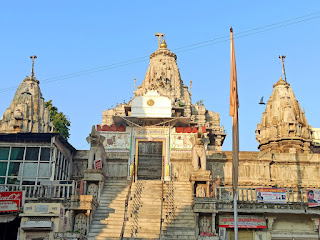
The Jagdish temple has been dedicated to the Hindu god, the preserver of the universe, Lord Vishnu. The Jagdish temple is an ancient temple and is more than three centuries old and was originally built by Maharana Jagat Singh in the Hindu “Vastushastra” style. The temple is located in the City Palace complex, Udaipur. The Jagdish temple is well known for the intricate carvings done on the pillars and doorways.
One can see almost 50 pillars on both the floors and all of them have unique carvings on them. The main shrine of this temple has on display a huge four armed image of Lord Vishnu, which has been carved out of single carved out of a single black rock. The main shrine appears to be surrounded by many smaller shrines of Lord Shiva, Goddess Shakti, and the Sun God and of Lord Ganesha. People believe that taking a walk around the temple in a clockwise manner brings in good luck.
- Timings: 5:00am to 12:00pm and then from 4:00pm to 9:00pm, on all days of the week.
- Entry Fee: No entry fees
- Visit Duration: 15 to 30 minutes
- Best time to Visit: Winter season- November to March
- How to Reach
- By Road: Jagdish Temple is well-connected to all nearby foremost places within the state Rajasthan or neighboring states by Road network.
- By Airport: The closest airport is Udaipur Airport named as Maharana Pratap Airport to Jagdish Temple, connected by daily flights to Jaipur, Delhi, Jodhpur and Mubai.
- By Bus: Jagdish Temple is easily accessible by RSRTC bus, local bus or local taxi to all nearby foremost places within the state Rajasthan or neighboring state.
- By Train: The closest junction is Udaipur City Railway Station to Jagdish Temple.
Steep in the splendor of this beautiful temple’s architecture to make your vacation worthwhile. Lakshmiramana Swamy Temple lies in the idyllic locations of Western Ghats and in close vicinity to the majestic Mysore Palace. Along with its high archeological significance, the temple has the distinction of being the oldest in the state too. This important venue is dedicated to Nambinarayana, an avatar of Lord Vishnu. Complete with a discus and conch, the idol of the main deity finds a pride of place in the sanctum sanctorum of this temple.
The adjacent cell placed beside the deity houses a beautiful idol of Lakshmi, the consort of Lord Vishnu. Here, you will also come across a 4 feet idol of Venugopal. The mesmerizing Mandapa built behind the temple was built in the 17th century by Kanteerava Narasaraja Wodeyor and is a must visit!
- Timings: All days of the week 8:00 AM – 9:30 AM 7:00 PM – 8:00 PM
- Entry Fee: No entry fee
- Visit Duration: 30 to 45 minutes
- Best Time to Visit: During Dussehra celebration.
- How to Reach
- By Road: Lakshmiramana Swamy Temple is well connected by other major towns and cities of Karnataka by Road Network.
- By Airport: The closest airport is Mysore Airport which connects Lakshmiramana Swamy Temple to all major Indian Cities.
- By Bus: Lakshmiramana Swamy Temple is well connected by other major towns and cities of Karnataka by using KSRTC bus or private bus services.
- By Train: Mysore Railway Station is the closest junction to Lakshmiramana Swamy Temple which connects with all major Indian cities.


